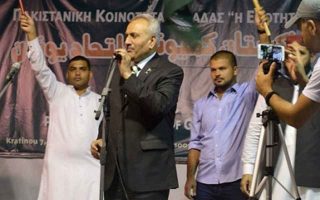Amnesty Int’l senior researcher voices concern over Turkish judiciary

There is an interesting backstory to the relationship between Amnesty International and Recep Tayyip Erdogan. Twenty years ago, the man who is now Turkey’s president was at the beginning of his political career as Istanbul’s new and ambitious mayor, when he was imprisoned by the secular authorities for publicly reciting a religious call-to-arms. Amnesty International quickly declared Erdogan a prisoner of conscience and began a dynamic campaign demanding his immediate release, including a strongly worded letter to the government of the time.
Twenty years later, the tables have turned quite unexpectedly. The chair of Amnesty International Turkey, Taner Kilic, has spent over eight months in jail while facing accusations of participation in networks affiliated with self-exiled cleric Fethullah Gulen, whom Erdogan has described as the “mastermind” behind the attempted coup in July 2016. The state’s allegations against him revolve around the controversial messaging app ByLock, which authorities regard as the main communication tool employed by the coup organizers. However, Kilic has consistently denied having anything to do with the coup or the app, and Amnesty has commissioned several independent expert reports that confirm that his phone had no trace of ByLock. Indeed, prosecutors have postponed the trial three times, unable to present any conclusive evidence that confirms the charges. But Amnesty’s Turkey chair remains in detention, and the organization remains preoccupied with his case and the erosion of human rights in Turkey.
Kathimerini chatted with Andrew Gardner, Amnesty International’s senior Turkey researcher, about Kilic’s case, as well as the widespread challenges to fairness, transparency and justice in Turkey. “Taner is one of the world’s most renowned refugee coordinators and human rights defenders. Suffice it to say that even the head of the United Nations refugee agency expressed disappointment in the way his case is being handled by the authorities,” said Gardner, adding that Taner has been an impressive voluntary advocate for human rights for more than 15 years.
Amnesty International’s senior researcher was quite critical of Turkey’s judicial system, with regard to the often arbitrary nature of prosecution in politicized trials. “Even though it’s been over eight months of detainment, the prosecution has failed to find any reliable evidence that Taner was using ByLock, and the trial continues to be postponed. One would assume that when there is an allegation, the accused is presumed innocent until proven guilty beyond reasonable doubt. Unfortunately, in Taner’s case – as well as a number of other cases in Turkey – the burden is reversed.”
Though he expressed a note of optimism about the final outcome of the trial, due to independent reports that confirm Kilic’s innocence, Gardner remains skeptical toward the judiciary: “The procedure so far has been very arbitrary and full of delays. Unfortunately, we cannot think of any other reason to explain this other than the fact that he is being targeted due to his human rights work.”
Kilic’s case is only a small fragment of a complicated mosaic of cases that have concerned Gardner and the rest of the Amnesty team in Turkey over the past two years. “There have been more than 50,000 individuals accused of involvement with Gulen’s terrorist organization. In most cases there is no credible evidence of any offense, let alone terrorism. Unfortunately, the situation has hardly improved since 2016,” said Gardner with disappointment, adding, however, that at least the number of allegations of torture and ill-treatment during police detention has dropped significantly.
Despite the perpetuation of arbitrary allegations, the Amnesty International researcher sees a beacon of hope in Turkish society and the evolution of popular narratives. “In the aftermath of the coup, there was a lot of anger against the perpetrators, which is to be expected after the hundreds of deaths and injuries that occurred overnight. However, nowadays, the perception that the tens of thousands of individuals accused are indeed guilty has massively eroded. There is a widespread acceptance, irrespective of whether people are supporters of the government or not, that the state of emergency has been abused to stop dissent against the government, that something has gone deeply wrong and things need to be brought back to normalcy.”
Toward the end of his conversation with Kathimerini, Gardner also commented on the situation of the eight Turkish officers who are seeking asylum in Greece, while Turkish authorities are requesting their extradition. “I am quite hesitant to draw an immediate parallel with Taner’s case, since the nature of the charges against the eight officers is extremely different. Also, unfortunately, there is not enough transparency to comment on their individual asylum applications. On the other hand, one only needs to consider that a quarter of the judiciary itself is either dismissed or in prison. There are extreme pressures on judges and prosecutors – we recently saw a judgment by the top constitutional court of Turkey, concerning the release of two critical journalists, be completely and arbitrarily overruled. For those wondering about the potential of a fair trial in Turkey, facts speak for themselves.”
Gardner’s concerns over justice in Turkey seem to be echoed by others. Just a day after he spoke with Kathimerini, 17 Turkish citizens landed on the shores of the Greek island of Oinousses. They were mostly civil servants and judicial officers, fearing unfair prosecution and seeking political asylum in Greece.





